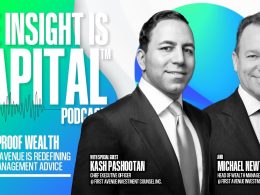How to Help Your Clients Who Are Overspending in Retirement
by Commonwealth Financial Network
 Clients overspend in retirement for a number of reasons. Maybe they can’t say no to their kids (who are financially irresponsible themselves). Maybe they want to enjoy their money before their health fails. Or maybe it’s just habit. Whatever the reason, how can you help your clients who are overspending in retirement—in a way that has a good shot at changing their ways? Luckily, for every bad financial behavior, there are techniques that can lead to positive change.
Clients overspend in retirement for a number of reasons. Maybe they can’t say no to their kids (who are financially irresponsible themselves). Maybe they want to enjoy their money before their health fails. Or maybe it’s just habit. Whatever the reason, how can you help your clients who are overspending in retirement—in a way that has a good shot at changing their ways? Luckily, for every bad financial behavior, there are techniques that can lead to positive change.
Here, we’ll discuss three behavioral principles that impede change, and then share how these same obstacles can be turned into opportunities. Understanding what's behind our clients' financial decision making (in this case, overspending) improves our chances of making difficult conversations go well.
Confirmation bias is part of our basic neural wiring. Most likely there to make the brain operate more efficiently, it leads us to heavily value information that confirms our existing beliefs. For example, say you believe that BMWs are reliable cars and Audis need a lot of repairs. Every time you hear of an Audi in the shop, it will be recorded indelibly in your mind, while mentions of BMW breakdowns will be more readily dismissed.
In terms of your clients, if they think they are likely to spend far less in retirement than you are suggesting, it’s very difficult (though not impossible) to convince them otherwise. One remedy for combating this confirmation bias is to show curiosity about what your clients believe and why. The Socratic method of asking questions is powerful because we're more likely to change our opinions when talking than when listening—so ask curious questions that force clients to confront some of their beliefs. For instance, if your clients aren’t worried about their overspending due to a belief that their expenses will drop later in retirement, you could ask questions like:
- What leads you to believe that retirement costs less than life before retirement?
- What factors are similar to and different from your parents’ generation that might cause our retirements to be more expensive than life before retirement?
- If it turned out to be more expensive, what would be the impact?
If you want to make a statement that goes against something the client believes, it can be savvy to ask permission first, thus opening the client’s mind to the new data. For example:
- “Would it be useful to hear what percentage of my clients end up spending more than expected?”
- “If I had a different sense of how much you might need later, would you want to hear about it?”
Even if the client declines your offer, you’ve planted a seed that will likely take root in his mind. As he’s brushing his teeth later that night, he might wonder, “What did my advisor mean that I might spend more later?” This is a client who is now ready to listen.
Opportunity: Since confirmation bias simply means that individuals are likely to believe what they already believe, one opportunity is to find a deeply held belief in your favor—and latch onto it. For example, if clients believe in treating kids equally, frame the need to reduce their support for one child as being more equitable to another child or children. If they are concerned about their health as they age, point to rising health care costs. Rather than always trying to change beliefs from scratch, it can be helpful to piggyback on preexisting beliefs.
Numerous studies have shown that our conscious and unconscious thoughts of who we are powerfully drive our behavior. If we consider ourselves environmentally conscious, for example, we’re more likely to turn off the car instead of letting it idle while we’re waiting for someone.
With your clients, try reframing a desired behavior in a way that fits their existing identity. This may mean asking supportive parents hard questions, such as, “Do you think some struggle is beneficial for children?” or “Have you seen any of your friends give money to their children at the expense of allowing their children to become self-sufficient?”
Once you’ve asked a question that piques your clients’ interest about their behavior, tie it back to their identity. Here’s an example:
You’re one of the most loving mothers I know—and that’s why I believe that even if it’s hard for you, and even if it hurts your relationship with your son temporarily, weaning him off of your financial support is one of the kindest, most generous things you can do as a devoted mom.
Even more challenging, though, is to turn around an identity completely. For instance, if your clients are concerned about their status in society, you’ll need to chip away at the importance of that identity in order to curb their spending. As with any behavioral issues, consider what their motivation to change might be. Focus their attention on ways their current behavior is causing them pain, as well as ways new behavior could be pleasurable.
Opportunity: Try to discover other identities your clients can relate to. Are they patriotic? Charitably inclined? You may be able to steer them toward an identity that helps them exhibit behaviors that will curb their spending—for example, spending time, not money, supporting a cause dear to them.
The easiest thing in the world is to just continue down the current path. To change, we first need to have a glimpse of a life we prefer. Help clients break through inertia by asking about what they’d really enjoy spending time on, that doesn’t cost a lot. Or what a meaningful vacation could look like that costs $2,000 rather than $10,000.
Wherever clients are overspending, ask questions about the solution (or the alternative behavior). The more they can visualize a palatable or even enjoyable alternative, the easier it will be for them to try out that behavior. For example, you might ask them what the most enjoyable hobbies they’ve had throughout their life that weren’t very expensive.
Another technique is to propose an experiment. “Instead of spending your normal $1,000 per week, what is the least amount you could spend in a single week and still enjoy life?” Let them control as much of the experiment as possible, and let them know there is no pressure to change; they’re just doing a little experiment.
Opportunity: Use inertia for the good habits. As you help clients start to change their behavior, those things too will become habits.
Despite your best intentions and efforts, ultimately it’s your clients’ job to change. You can guide them and give them tools, but at the end of the day, their success or failure is in their hands. For your protection, be sure to let clients know when their spending is unsustainable, and always document your conversations.
What strategies do you us to have conversations about overspending? Please share your thoughts with us below!
Commonwealth Financial Network is the nation’s largest privately held independent broker/dealer-RIA. This post originally appeared on Commonwealth Independent Advisor, the firm’s corporate blog.
Copyright © Commonwealth Financial Network
















